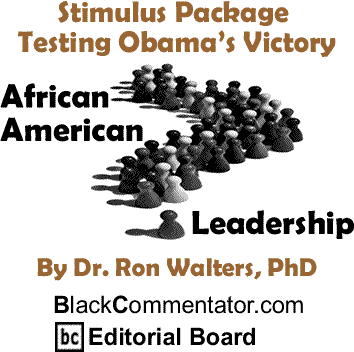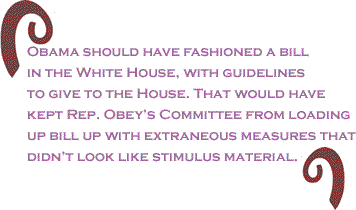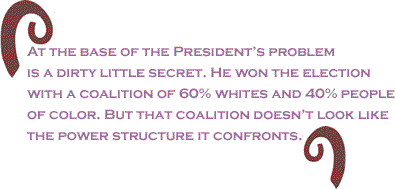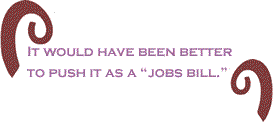
|
|||||||||||||||||||||||

|
|

Custom Search
|
|
 |
|
By now, it should be clear to everyone that the change called for by the American people in the election of 2008 will be difficult to come by because it will not be gained by President Barack Obama simply waving a wand. Once this fight to enact the Stimulus Package is over, he will claim an important victory for having done it so quickly after his Inauguration, but he will also have learned important lessons on how to fight. One lesson was how to manage bi-partisanship in the Congress. The first mistake was to give the process of shaping the Stimulus Package for the most part, to the House Appropriations Committee. Obama should have fashioned a bill in the White House, with guidelines to give to the House. That would have kept Rep. Obey’s Committee from loading up bill up with extraneous measures that didn’t look like stimulus material. In turn, that would have lessened the opportunity for Republicans to criticize it and finally not vote for it on that basis. Obey also gave too much ground in tax cuts to Republicans, rather than starting low and ending up with 30% of the bill. It put the President on the defensive, trying to explain that the so-called “pork” in the bill only constituted 1% of it, but not having it there in the first place would prevented him, in the end, from having to call a meeting of the House Democratic Leadership to try to get it out. Another lesson is how to lead in the arena of policy interpretation. To the public, to push a piece of legislation that would help them as a “Stimulus Package” is confusing economic-speak. It would have been better to push it as a “jobs bill.” The fuel for this was the fact that the economy loss 2.5 million jobs last year and over 500,000 in the month of January 2009. But the media didn’t play along and gave Republicans a great opening to seize the leadership of interpreting the bill by criticizing it as “pork” and as “wasteful spending.” To be fair to President Obama and the Democrats, many of the items such as those in education have been propose for some time, such as increases in Pell grants, or school construction, but they haven’t had the control of the Congress and the White House to enact them. They made a judgment that putting these items in a bill which was sure to pass, made it more likely these measures would be enacted. On the other hand, Republicans wanted such items to come up in “regular order,” in other words, in the Education appropriation process, where they would not be pressured to support them. In fact, we will see what happens in “regular order” when the heat of the Stimulus dies down and other important measures come up in various committees. At the base of the President’s problem is a dirty little secret. He won the election with a coalition of 60% whites and 40% people of color. But that coalition doesn’t look like the power structure it confronts. When that coalition confronts the power structure and pushes for change, it confronts the overhang of conservative politics: media favoritism to that ideology backed by a muscular intellectual establishment, and a Democratic party in Congress that lacks the discipline to overpower the opposition. This situation will come up repeatedly. So, the President will have to use his considerable skills of communication to go to the American people to force change in the Congress. As I have argued here many times, he needs a formidable force outside of the Congress to help with the problem of mismatch between his winning coalition and the power structure in place. The new organization, ‘Organizing for America’ was given orders to have house meetings where there could be “policy discussions” on the Stimulus Package. But this coded language was not “let’s go to war” and exact some accountability from our elected officials. The OFA should be given clear instructions – perhaps not by the President -- to organize for change by pressuring local officials to get in line. Or why does it exist? One thing that puzzles me is why the President has to learn much of anything with such experienced people around him. The loss of Tom Daschle as crucial because he was a respected political operative, better in my book that Harry Reid. President Obama has lots of policy experts, now he should find expert political operatives to handle the strategy that gets things done. BlackCommentator.com
Editorial Board member
Dr. Ron Walters is the Distinguished Leadership Scholar, Director
of the African American Leadership Center and Professor of Government
and Politics at the University of Maryland College Park. His latest
book is: The
Price of Racial Reconciliation (The Politics of Race and Ethnicity) |
|
Any BlackCommentator.com article may be re-printed so long as it is re-printed in its entirety and full credit given to the author and www.BlackCommentator.com. If the re-print is on the Internet we additionally request a link back to the original piece on our Website. Your comments are always welcome. eMail re-print notice
If you send us an eMail message we may publish all or part of it, unless you tell us it is not for publication. You may also request that we withhold your name. Thank you very much for your readership. |
|
| |
|
| February
12, 2009 Issue 311 |
|
| Executive Editor: Bill Fletcher, Jr. |
| Managing Editor: Nancy Littlefield |
| Publisher: Peter Gamble |
| Est. April 5, 2002 |
Printer Friendly Version
in resizeable plain
text format or pdf
format. |
| Frequently Asked Questions |
 |

|
 |
 |
 |
| |
| |







































